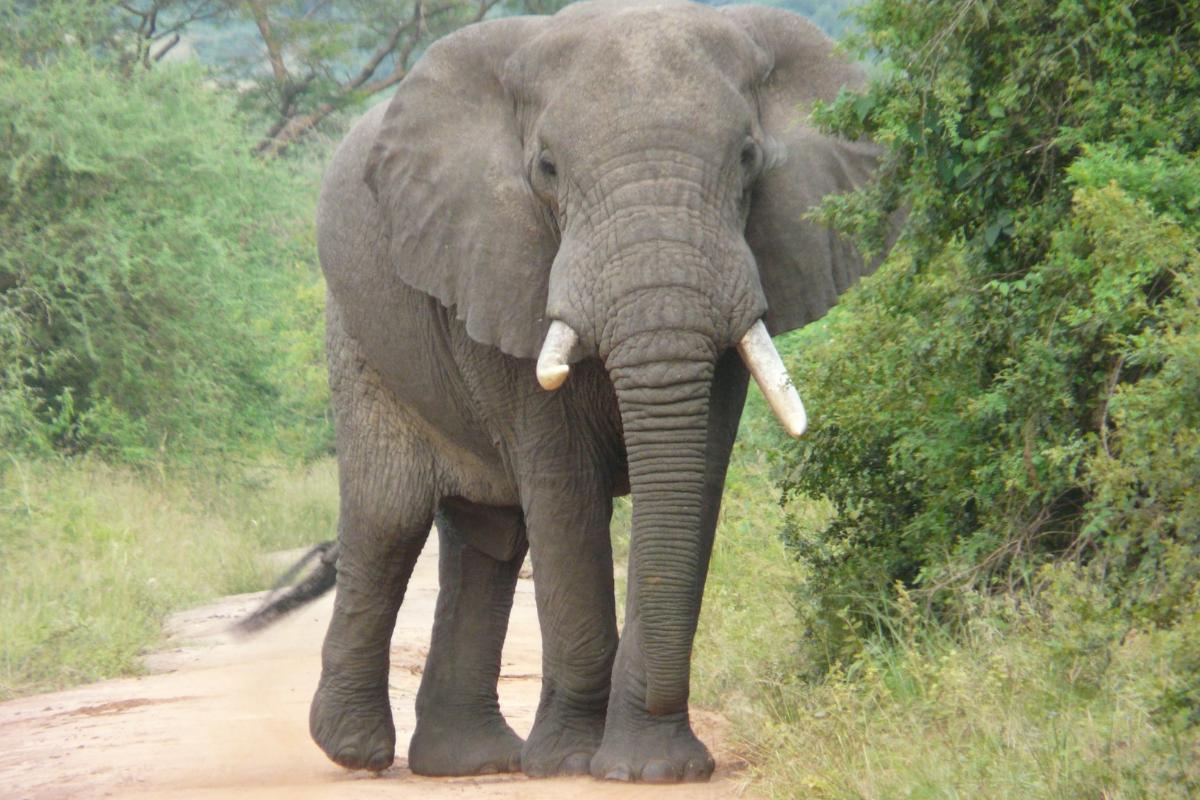Do Elephants Have Good Memory?


The elephant, the largest land mammal on Earth, has long captivated human imagination not only with its immense size but also with its exceptional intelligence and capacity to remember. The saying that "elephants never forget" is a testament to their renowned memory, but does it hold true?
In this AnimalWised article, we explore whether elephants have good memory and uncover the evidence behind their remarkable ability to remember. Elephants' memory plays a pivotal role in shaping their lives and interactions with the world around them, from their intricate social bonds to their capacity for learning.
Memory capacity in elephants
The elephant brain is the largest of all land mammals, weighing in at around 11 pounds (5 kilograms). It is nearly three times the size of the human brain. This sheer size hints at the potential for exceptional cognitive abilities. A larger brain provides more room for complex neural connections and structures, allowing elephants to process a vast amount of information.
At the heart of the elephant's memory prowess lies a structure known as the hippocampus. The hippocampus is a critical region in the brain responsible for the formation and retrieval of memories.
In elephants, the hippocampus is not only well-developed but also highly convoluted, creating an extensive surface area. This complexity is thought to enhance their memory capacity and their ability to store a vast array of information.
While humans are often lauded for their intellectual capabilities, certain aspects of the elephant brain challenge our understanding of memory. The elephant's brain, particularly the temporal lobe and its intricate relationship with the hippocampus, showcases similarities to human brain structures associated with memory. This suggests that, in certain aspects, elephants might rival or even surpass humans in the realm of memory.
Learn more about the other most intelligent animals in the world in this other article.
How elephants use their memory
The memory of wild elephants plays a pivotal role in their survival and the nurturing of intricate social bonds. In the vast and often challenging landscapes of their natural habitat, elephants rely on their memory to navigate and locate crucial resources. They remember the locations of watering holes, fertile feeding grounds, and safe migration routes. Their ability to recall these sites across seasons and even years is a testament to their acute memory.
Wild elephants undertake extensive migrations in search of food and water. Their long-term memory guides these journeys, ensuring they can return to known, resource-rich areas.
The elephant's memory isn't solely about individual survival. It plays a pivotal role in maintaining social cohesion within elephant herds. Matriarchs, often the eldest and most experienced females, carry within their memory banks a wealth of knowledge about the herd's movements and vital resources.
Matriarchs use their long-term memory to lead their herds to areas with abundant food and water. Their wisdom, accrued through years of experience, ensures the survival and well-being of their herd members.
Beyond survival, memory is integral to the transfer of knowledge across generations. Younger elephants learn from their elders, not through formal education, but through observation and direct experience. The wisdom of older elephants, particularly matriarchs, guides the younger generation in understanding their environment.
How elephants use their memory and communication
Elephants are not only known for their memory but also for their sophisticated communication abilities.
Elephants are prolific users of vocalizations to convey information. Their deep rumbles, trumpets, and a variety of calls are not just sounds; they are the building blocks of their communication. The memory of individual calls and their meanings is essential for elephants to recognize and respond to the presence and emotional state of other herd members.
Observational studies have revealed that elephants can remember and respond to the vocalizations and gestures of individuals who are absent but known to the herd. This showcases their memory's role in maintaining relationships and social bonds within the group.
Elephants' cognitive abilities are further illuminated by their capacity to understand and respond to human language. They can comprehend vocal commands and cues, showcasing their ability to process and remember a variety of auditory signals. This attribute has been harnessed in various conservation and management efforts, emphasizing the adaptability of their memory in interacting with humans.
To delve deeper into how elephants communicate using sound, body language, and scent, explore our separate article dedicated to elephant communication.

Evidence of good memory in elephants
Elephants' remarkable memory is evident in various aspects of their lives, demonstrating their cognitive prowess and adaptability. As mentioned before, elephants are renowned for their ability to remember the locations of crucial resources such as food and water sources, even over long distances and extended periods.
However, perhaps one of the most compelling pieces of evidence for elephants' extraordinary memory is their ability to recognize individual humans and other elephants, even after years of separation. This recognition extends beyond mere familiarity; it's a profound acknowledgment of the unique identities of others. This social memory allows elephants to maintain lasting relationships and social bonds, crucial in their cooperative and complex society.
The memory of elephants is not limited to recognition but also extends to complex learning and problem-solving. They have been shown to learn and perform intricate tasks, such as using tools and even operating machinery. These skills require the retention of knowledge over extended periods, reflecting their capacity for both short-term and long-term memory.
Learn more about the diverse and fascinating habitats where elephants live in our other article.
Why do they say that elephants never forget?
While the saying "elephants never forget" is a popular expression, it is not entirely accurate if taken literally. Elephants do have exceptional memories, but like all animals, their memory is not infallible, and it varies from individual to individual.
The role of memory in elephant mourning rituals
Elephants, known for their emotional depth, capacity for empathy and grief, demonstrate mourning rituals that reflect their complex memory and understanding of loss. They approach the deceased with gentleness, using their trunks to touch and explore the body. This suggests a deep emotional connection and recognition of the individual.
Herd members may stand quietly beside the deceased for extended periods, paying their respects. This silent vigil displays their emotional memory and understanding of loss. Elephant mourning rituals are intrinsically tied to their memory, as they recognize not only the deceased but also the circumstances surrounding the loss. Elephants can recognize specific individuals even after a long separation, and their memory of the deceased plays a crucial role in their mourning behavior.
The memory of the herd as a collective is evident in these mourning rituals, as herd members gather around the deceased individual. This indicates a shared understanding of loss and a collective expression of grief.
Learn how long elephants live and what factors contribute to their long lifespan in our other article.
If you want to read similar articles to Do Elephants Have Good Memory?, we recommend you visit our Facts about the animal kingdom category.
- Chusyd Daniella E., Ackermans Nicole L., Austad Steven N., Hof Patrick R., Mielke Michelle M., Sherwood Chet C., Allison David B. (2021). Aging: What We Can Learn From Elephants. Frontiers in Aging . Volume 2. Available at: https://www.frontiersin.org/articles/10.3389/fragi.2021.726714
- Hoerner F, Lawrenz A, Oerke AK, Müller DWH, Azogu-Sepe I, Roller M, Damerau K, Preisfeld A. Long-Term Olfactory Memory in African Elephants . Animals (Basel). 2023 Feb 15;13(4):679. doi:10.3390/ani13040679. PMID: 36830466; PMCID: PMC9951961.
- Polansky, L., Kilian, W., and Wittemyer, G. (2015). An elephant never forgets the way to the watering hole . Available at: https://royalsociety.org/news/2015/03/an-elephant-never-forgets-the-way-to-the-watering-hole/
- Ritchie, J. (2009). Fact or Fiction?: Elephants Never Forget . Available at: https://www.scientificamerican.com/article/elephants-never-forget/






